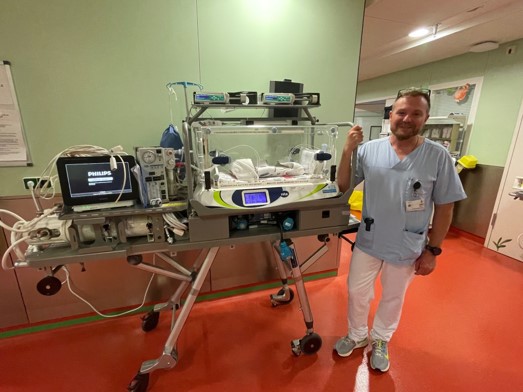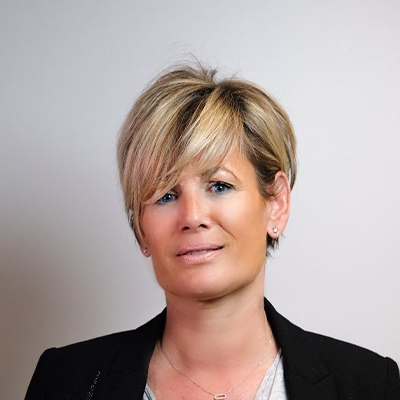When 5G accompanies the transfer of babies in neonatology - DEEP
When 5G accompanies the transfer of babies in neonatology
14 October 2024
At Healthcare Week Luxembourg, held at Luxexpo in early October, the CHL unveiled a project for a connected incubator. Thanks in particular to the 5G connection, the aim of this innovation is to remotely monitor and support, without interruption, the transfer of newborn babies in distress from a regional hospital to the CHL. DEEP, with its digital expertise at the service of the health sector, as the historical operator of the Luxembourg mobile network, is one of the main partners accompanying the implementation of this project.
In the Grand Duchy, the neonatology department of the Centre Hospitalier de Luxembourg (CHL) is the referral centre for all newborn babies in emergency situations throughout the country. Infants born in the region's hospitals and requiring specific care or intervention are regularly transferred there. Such transfers require the utmost care and constant monitoring. In order to provide better care for these babies, the CHL, in partnership with the Centre Hospitalier du Nord (CHDN), is currently implementing a connected incubator project based on 5G technology. DEEP is one of the partners supporting the hospitals.
Supporting the care of babies from a distance
When a baby is born prematurely and is in distress, the medical teams at regional hospitals call on the CHL's neonatal department, which has the expertise required to advise and support the baby's care,’ explains Valérie Boissart, head of the CHL's Biomedical Engineering unit. Our teams support them remotely, by setting up a visual connection via video-conferencing tools, enabling them to see the baby and his vital parameters and to communicate with the medical staff who are with him. In some cases, the situation requires the newborn to be transferred to the CHL.
5G to guarantee connectivity during transfer
Currently, it is not possible to monitor the baby and its vital parameters throughout the transfer. ‘During the journey, both the CHL team and the team at the site from which the baby is leaving are blind. The history of the treatment is interrupted, and the transfer of monitoring data is not optimal. The current inability to follow the baby in the chartered ambulance remains a problem,’ continues Valérie Boissart.
Today, with the deployment of 5G technology, the medical teams have studied the possibility of remedying this problem. A telemedicine project supported by the CHL aims to create a connected incubator that will ensure uninterrupted care and monitoring.
A mobile, connected mini-hospital
‘This incubator is like a mini-hospital, capable of providing optimum support for premature newborn babies. It includes a 12V power supply, a 4-hour battery, a syringe pump, a heated incubator, a safety belt, a respirator and equipment for monitoring the patient,’ explains Valérie Boissart. As part of this project, we added a lightweight tablet, which enables us to maintain a permanent high-quality visual connection with the baby and the medical team accompanying him or her. The equipment also collects the baby's vital parameters and transmits them in real time to the CHL. In this way, monitoring is never interrupted’.

Guaranteeing system resilience and security
To function, the solution relies on the 5G network operated by DEEP. As Glenn Van Bost, Head of Telecom at DEEP, explains, ‘One of the first challenges in this project was to ensure that the various systems, both at hospital level and in the incubator, communicated well with each other, by guaranteeing the interoperability of the systems. As the incubator leaves one establishment to go to another, the tablet had to be able to continue communicating with the parties involved in an autonomous and secure way. Using a SIM card and the 5G network, it is then connected to the Healthnet network, which is operated by DEEP and dedicated to the healthcare sector, so that the data can be transmitted to the software solutions used’. The history of the baby's care data accompanies him throughout the journey, to ensure optimum monitoring.
Critical communication requires high availability
The other major challenge is network quality. We have to guarantee a critical communications service, on which human life depends,’ continues Glenn Van Bost. It is imperative to guarantee the quality of the connection and the availability of the network at all times. To support such projects, DEEP has invested heavily in its 5G mobile network, recognised by independent bodies as the best in the country. Beyond that, this project has enabled us to explore the potential of 5G, particularly in terms of prioritising use cases and guaranteeing the availability of certain frequencies. The technology enables us to provide connectivity for essential services while ensuring secure exchanges.
This telemedicine application is a first. The project, which brings together seven partners, was launched a year and a half ago. The incubator should be operational for testing by the end of the year.
Contact us
Do you have any questions about an article? Do you need help solving your IT issues?
Contact an expert







Our experts answer your questions
Do you have any questions about an article? Do you need help solving your IT issues?

